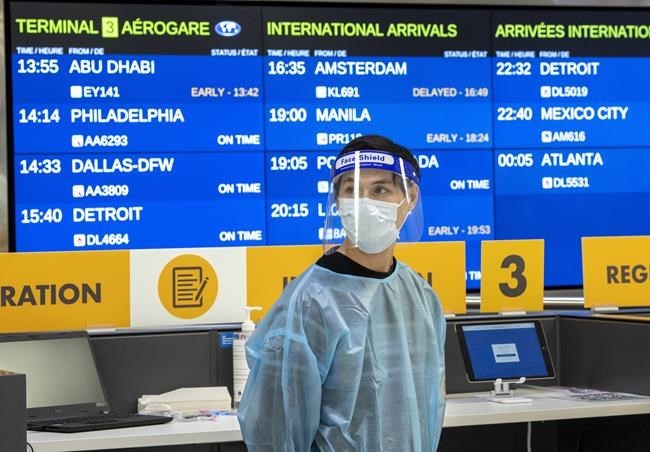WASHINGTON — The federal government welcomed fully vaccinated foreign nationals back to Canadian soil Tuesday as frustrated families on both sides of the Canada-U.S. border urged Congress to find out why the White House isn't following their lead.
As of midnight Monday night, quarantine requirements were eased for non-essential international travellers who have had a full course of a Health Canada-approved COVID-19 vaccine.
To be eligible, travellers must have allowed at least 14 days to pass since their last vaccine shot and show proof of a negative molecular test for COVID-19 that's no more than 72 hours old.
They are also required to use the ArriveCAN app or online web portal to upload their vaccination details.
The change marked the latest stage in Canada's gradual easing of travel restrictions that were first imposed on travellers of all nationalities at the onset of the COVID-19 pandemic back in March 2020.
But nearly 18 months later, the U.S. has resisted the mounting pressure to reciprocate, frustrating businesses that depend on incidental cross-border traffic and angering residents desperate to see expatriate friends and family.
"The U.S. government has failed to follow the science and allow vaccinated and tested Canadians to cross the U.S.-Canada land border," the grassroots group Let Us Reunite said in a statement.
On Tuesday, the group urged its thousands of Facebook followers to barrage U.S. legislators with demands for a congressional hearing into the imbalance, singling out Homeland Security committee leaders Sen. Gary Peters and Rep. Bennie Thompson.
They want the Senate and House committees "to provide oversight and accountability by adding the U.S.-Canada border closure to their committee agendas and conduct hearings on the impact" of the travel ban.
"Eighteen months is too long to separate families when reunification can be done safely."
So far, Canada's experience appears to bear that out.
Nearly three weeks after fully vaccinated U.S. citizens and permanent residents were allowed back over the border, random COVID-19 surveillance tests found a positivity rate of just 0.19 per cent, despite a growing caseload in both countries.
"While cases are currently increasing in Canada, the illness severity and hospitalization rates remain manageable as Canada's vaccination rates continue to rise," the Canada Border Services Agency said in a release.
"This data, along with continued adherence to public health measures by Canadians and incoming travellers, means that Canada is better able to prevent outbreaks of infection and can now allow more incoming fully vaccinated travellers without increasing the risk to the health and safety of Canadians."
Eligible foreign nationals planning to take advantage of the latest Canadian exemption were mainly expected to be arriving by air, making matters easier for border agents.
"The great thing in air is that you've got the airline working with you," said Denis Vinette, vice-president of the agency's travellers branch.
Airlines, he said, "will not allow individuals to get on if they're not meeting all of the requirements."
Canada has approved four COVID-19 vaccines: Pfizer-BioNTech, Moderna, the Oxford-AstraZeneca shot, also known as Covishield, and the single-dose Johnson & Johnson option.
Vinette said the agency will continue to conduct random tests among travellers, part of a surveillance program that has been in place since the phased-in process of easing travel restrictions began earlier this summer.
Direct flights from India and Morocco will remain suspended until at least later this month. Travellers from either country who take an indirect route to Canada will be required to produce a recent negative molecular test taken in a third country.
In addition to the land borders with Canada and Mexico, the U.S. has restricted travel from several foreign countries, including China, India, Ireland, Iran, South Africa, Brazil and the 26 European countries without border controls, known as the Schengen group.
The borders with Canada and Mexico are widely seen in a different category, in part because of the close trade ties between the three countries as well as the fact that visitors can arrive by land without the help of a private-sector company like an airline or cruise ship operator.
While non-essential Canadian travellers are forbidden from entering the country by land, rail, ferry and pleasure boat, air and sea travellers have been exempt from the outset — a discrepancy that infuriates families with members who live a short drive over the border from each other.
The ongoing restrictions have at least made life easier for Canada's border agents. The inability to cross into the U.S. for short incidental trips has meant fewer people trying to return to Canada than might otherwise be the case.
"In a normal year, throughout the summer, about 65 per cent of our border crossings are what we term day trippers," Vinette said.
"Currently, we only have unidirectional entry, and so you don't have day trippers from Canada going to the U.S. and then coming back, which is a significant portion of our usual traffic volumes."
This report by The Canadian Press was first published Sept. 7, 2021.
James McCarten, The Canadian Press



